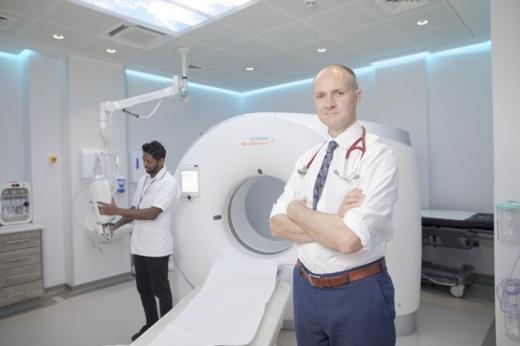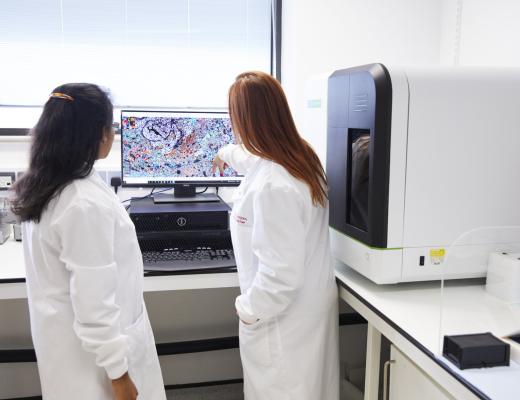New artificial intelligence (AI) model could improve lung cancer early diagnosis
Researchers at The Royal Marsden hope this technology will eventually streamline the analysis of patient scans, speed-up the detection of lung cancer and help to fast-track high-risk patients to treatment.
Through the LIBRA study, which was supported by The Royal Marsden Cancer Charity, researchers have developed an AI model that could accurately identify cancerous lung nodules.
Lung nodules are abnormal growths that are common and often benign, but can be cancerous – especially larger ones around 15–30 millimetres.

How does the AI model work?
Researchers analysed data from the CT scans of nearly 500 patients with large lung nodules. They used a technique called radiomics, which takes information from medical images that can’t be easily seen by the human eye.
To assess how effective the new model was at predicting cancer, researchers used a measure called AUC (area under the curve). An AUC of 1 indicates a perfect model and an AUC of 0.5 indicates a random guess. The results show that the new AI model was able to identify each nodule’s risk of cancer with an AUC of 0.87, improving on tests that are currently used in clinic.
Looking to the future

Dr Benjamin Hunter, Clinical Oncology Registrar at The Royal Marsden, said: “In the future, we hope this research will improve early detection and potentially make cancer treatment more successful by highlighting high-risk patients and fast-tracking them to earlier intervention.”
The new model may also help clinicians make decisions about patients who don’t have a clear referral pathway.
Dr Hunter adds: “Next, we plan to test the technology on patients with large lung nodules in clinic to see if it can accurately predict their risk of lung cancer.”
Early detection of lung cancer is vital
Lung cancer accounts for 21% of cancer deaths in the UK. Patients diagnosed in the early stages of the disease can be treated much more effectively, but recent data shows over 60% of lung cancers in England are diagnosed at either stage 3 or 4. So, initiatives to speed up detection are urgently needed.
Dr Richard Lee, who is funded by The Royal Marsden Cancer Charity, is chief investigator for the LIBRA study and Consultant Physician in Respiratory Medicine and Early Diagnosis at The Royal Marsden. He said: “While at an early stage, this study is an example of the vital scientific clinical research we’re undertaking in the Early Diagnosis and Detection Centre at The Royal Marsden and The Institute of Cancer Research (ICR). Through this work, we hope to push boundaries to speed up the detection of the disease using innovative technologies such as AI.”
Keith’s story
Keith Hewett, 64 from Watford, was diagnosed with lung cancer in 2018 and treated with surgery at his local hospital. He was then referred to Dr Richard Lee at The Royal Marsden for follow-up care.
Keith’s medical history is similar to the patients analysed in the LIBRA study. He said:

“After my first diagnosis, I had a CT scan at The Royal Marsden every three months and, just as they were about to become every six months, Dr Lee noticed a change on the scans. They weren’t sure what it was but agreed it needed further investigation. As I have arthritis, I can get lumps on my body which added more cloudiness to what was happening."
“It turned out that there were three nodules in my lungs which were cancerous, and I was treated with surgery at The Royal Brompton. My care at The Royal Marsden has been excellent as their attention to detail is great and I felt safe in their care."
“Any new technology that helps give more clarity over whether something on a CT scan is or isn’t cancer would be great. As a patient, you want to know whether you have the disease as soon as possible because the earlier the treatment, the better the outcome.”
We fund life-saving research
The LIBRA study was led by researchers from The Royal Marsden in collaboration with The Institute of Cancer Research, London (ICR) and Imperial College London.
It was supported by the Early Diagnosis and Detection Centre which aims to accelerate early diagnosis of cancer. This was established in partnership with the ICR and is supported by funding from The Royal Marsden Cancer Charity and the National Institute for Health and Care Research Biomedical Research Centre (NIHR BRC).
The study was also supported by Royal Marsden Partners and Cancer Research UK.
Help us fund more innovative research like the LIBRA study.


